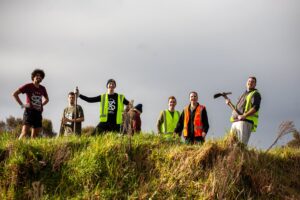 The Student Volunteer Army was formed in response to the devastating Christchurch earthquakes in September 2010. At the time, several young leaders rallied hundreds of willing helpers at very short notice to support the community in recovery and the massive cleanup. Their efforts gave students an exceptional volunteering experience where roles were quickly decided and collaboration became essential. The learning for everyone involved was significant.
The Student Volunteer Army was formed in response to the devastating Christchurch earthquakes in September 2010. At the time, several young leaders rallied hundreds of willing helpers at very short notice to support the community in recovery and the massive cleanup. Their efforts gave students an exceptional volunteering experience where roles were quickly decided and collaboration became essential. The learning for everyone involved was significant.
Ironically it is in times of crisis that groups of people pull together to help, and, as it is often said, these times often bring out the best in people. When people work together under such circumstances, recovery can happen quickly and on a large scale – and individuals gain valuable experience, a sense of making a contribution and networks that often last for years.
We are currently in a unique time in the planet’s history where there are now many problems in the world that need to be addressed. While there is some stability, we can all start thinking about where we would like to help – and take steps to move in that direction. Volunteering is a great way to contribute where some of these problems are showing up.
As the world continues to change, businesses and organizations will be looking for people to help to drive innovation and find solutions that benefit both society and the planet. Work opportunities in the future will be closely tied to the challenges that we face. Sometimes these opportunities appear in a crisis and by applying any volunteering experience and skills gained can lead you down a career path where you will be making a difference – and loving it.
People who are open to change, with fresh ideas, and who are motivated to help, will always be required.
Think about what problems you might like to help solve – and find ways to get involved
With global population growth exceeding infrastructure and resources in many areas of the world, there will be more people to house, feed and live healthy lives. This will result in plenty of work for all the social sciences, education, health, psychology, and every career pathway involved in community development and population health and wellbeing – and there are many!
The big problems caused by environmental destruction and depletion will need the support scientists, engineers, and urban, industrial, and architectural designers. Already, there is much work to do to build better, more resilient cities, rural areas, reserves, and productive land. Cyclone Gabrielle last year showed us this!
As the population ages, communities will be losing critical numbers across all service sectors. So people to work in social wellbeing and cohesion, medical areas across all disciplines and education will be in high demand.
Technology career pathways will cross all industries and the ethical use of technology will become very important. Careers in entrepreneurship, law, and policy will also matter in the future.
There will be more career opportunities than we think!
The world of work is changing so fast in response to the breakdown of existing structures and ways of doing things. Opportunities will arise for new ways of supporting communities and environmental and economic transformation. These opportunities are just around the corner and could be the pathway to deep job satisfaction.
Imagine the kind of future you want to live and work
Imagination is powerful and can help us gravitate toward a future we want. When we can connect to what is important to us and dream of a future where what matters is a reality – we can make it happen! Just as the Student Volunteer Army pulled together the resources to help Christchurch, we can all pivot as needed to help the planet. All we need is the willingness to help.
Kaye Avery, CareerEQ June 2024
kaye.avery@careereq.nz

Leave A Comment